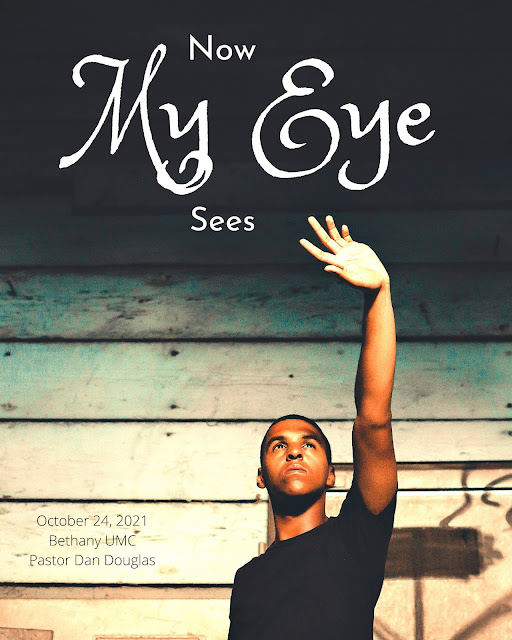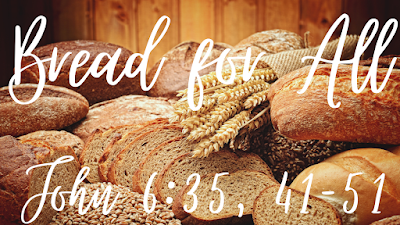Now My Eye Sees (Or, Job's Journey: Finding Faith and Overcoming Suffering) - Job 42:1-6, 10-17 (Proper 25B)
It has arrived - the final week of our series on Job. This reading seems to tie it all up, and hopeful even. But let’s take a step back for a minute. The title for the sermon today comes from verse 5, “My ears had heard of you, but now my eye has seen!” He had survived the suffering and accepted God’s power. Job had been told about all of this, as the Scripture says, but now… it was real. It wasn’t enough to hear of the grace; it needed to be experienced. On the outside looking in, Job appears to be blind. But maybe it was the darkness of his soul that we offered in our prayer earlier. If there is no light no hope, are we blind or just without resources?
Blindness has several definitions. The first is the apparent lack of eyesight. But more relevant, it means unquestioning - as in loyalty without question, having no regard for rational thought (as in a blind choice), or even without all information to consider data without bias (like in science for a single- or double-blind test).
As a quick recap of where we’ve been over the last three weeks, the book starts with Job, a wealthy yet faithful man, having nearly everything taken away from him. Job’s so-called friends talk trash about him, thinking it would be helpful because they all believe that good people are rewarded, and evil people are punished. Then God shows up, and God tells Job that he’s in way over his head, that Job couldn’t have the faintest idea what putting the stars in place and dividing the oceans from the land would even feel like - that God owed him no explanation, and that God is saying that He hadn’t created the suffering. The universe wasn’t designed to stop suffering. Let me repeat that differently… the universe is both beautiful and wild. Both dangerous and divinely created. It is in this split that the world exists and that duality is confusing and difficult to reconcile, but it is good in the eyes of God.
In popular culture today, there seems to be this notion that God will not give you more than you can handle. Or that He only gives the heaviest burdens to the best soldiers. Let me be clear - that is bad theology. We all have suffered; we all go through times when we need God, and he wants to hear it. He wants to know when our lives are too much; he wants to know when a helping hand or a needed shoulder could make a difference. He is generous and can provide resources, even with Job.
Faith is here - in the present and also in what has not yet happened. This whole book reminded me of the story of Noah in Genesis. Noah was also a highly faithful man, and God gave him a task - to build a boat and then fill it up because God was going to flood the world. So - Noah got his work done, and God saved all who listened to Noah, the animals and all. Everyone else may have been too caught up in their own lives to think what it might mean. He was preparing for a very uncertain future but had all the certainty of what he was called to do. I bet Noah had at least three friends who thought he was out of his mind as well.
Job had connected with the divine, and he knew that God did not abandon him. He was changed, plain and simple. He wanted God to answer him for all these shenanigans plaguing what he felt was just him, but given this eternal perspective from God, he humbled him to his core. Job came away from the experience with humility for the work God has done and the love that He has provided. He supported Job through the pain and suffering, and Job was grateful.
But in the end, God restores Job and even says that after praying for his friends, the Lord gave Job twice as much as before! Scholars aren’t entirely sure why this happened, but I’d like to think that it’s more like Noah like we talked about earlier. For those who may have forgotten the end of Noah’s story, when it was time for everyone to leave the ark, God made a covenant with Noah where God created the rainbow, saying (and I’m paraphrasing a bit), “I may have overshot my plan, so I’m not going to do it again. I will bless you because you endured what I have done.” Likewise, Job was this experiment for God, and he underwent suffering beyond imagination. So, in similar ways as the beginning of the book, I’d like to think he took this to his divine heavenly council and said, “Look - here’s my guy Job, he’s submitted to everything, he’s passed the test, let’s relieve him of these burdens.” Who knows what may have been lost in time from this story, and that’s my idea of why it gets wrapped up with a nice bow - like a gift. Not only that, but Job lives a full life - another 140 years to see the next four generations. In addition, In verse 15, Job’s inheritance was shared with his sons AND daughters. What a break in tradition and doing something new! We don’t know why this happened, but it may be a reminder that life itself is a gift and that we own none of it. Let God have control over what you have, and it can be used as a blessing to others.
So, what are the takeaways from our book? God is always present. We can have times in our lives when He feels far away, but our perspective can get in the way. When trouble comes to us, no matter the source, God hasn’t moved. Throughout Scripture, God is present through difficult situations. And even though Christ He suffered just as we do, even to the point of death, and overcame it. Looking back last week, God came to Job through the whirlwind. God made it known that he is present and in control. We should respond in faithfulness for who God is, not what he does or what we feel.
Second, in our suffering, it is not wrong to cry and get angry. God gave us emotions, and he wants us to use them. There are many examples throughout Scripture about people’s anger and lament towards God. Even Jesus cried and thought God had abandoned him. The problem comes when we believe that we can control or know better than what God offers. For our friends who are suffering, how can we show them that they are loved and appreciated and not like Job’s friends - questioning and blaming him and his virtue?
Lastly, life’s tension between the now and the not yet needs to be embraced, not ignored. More days have the stress of incompleteness and waiting than when we feel as though we are moving toward a significant goal. That doesn’t mean that work doesn’t need to be done in between, but the big payoffs can sometimes be few and far between. Being blind to seeing the whole picture is what Job lacked. Once he was able to see that view from God’s vantage point, he was humbled by all God does and is.
Being blind is a terrible condition, but it does not define all of a person’s limitations. Helen Keller was blind and deaf, so do these verses not even apply to her? Not at all! She was a fantastic advocate who pushed the boundaries of not only being disabled but in the era she lived; she was a woman! If there was someone to discredit, the conventional wisdom at the time was not on her side. God uses impossible situations to create new life again and again. It’s maybe no wonder that Jesus healed the blind as a miracle. All of us can, at times, be blinded to our sin, and it’s God through Jesus who can open our eyes to what a more inclusive and fuller life can look like! Let me leave you with a quote from the well-spoken Miss Keller - “Although the world is full of suffering, it is also full of the overcoming of it.” May you overcome the struggles you are facing, eyes open with faith, and trust in God’s goodness. Amen.




Comments
Post a Comment